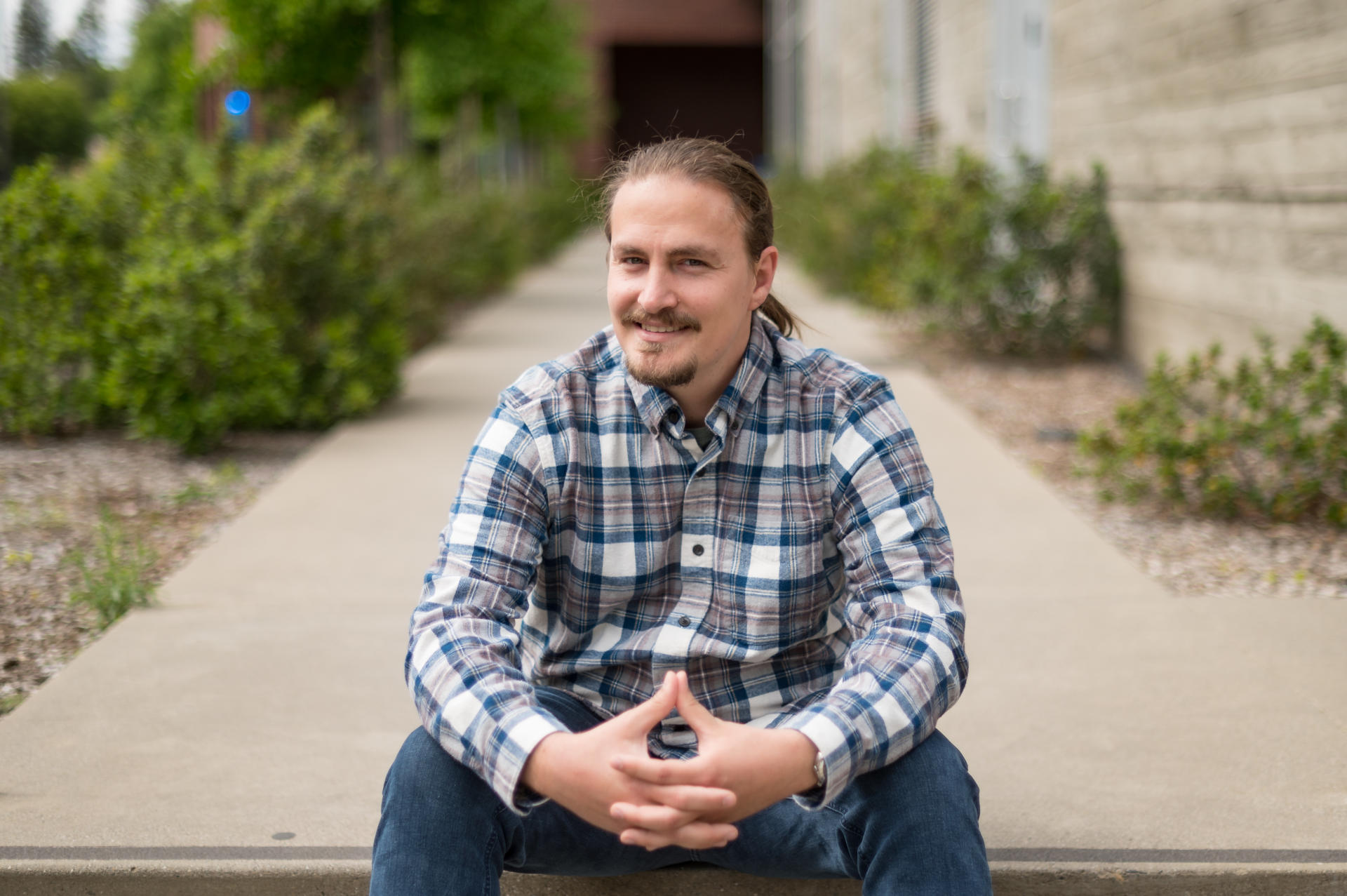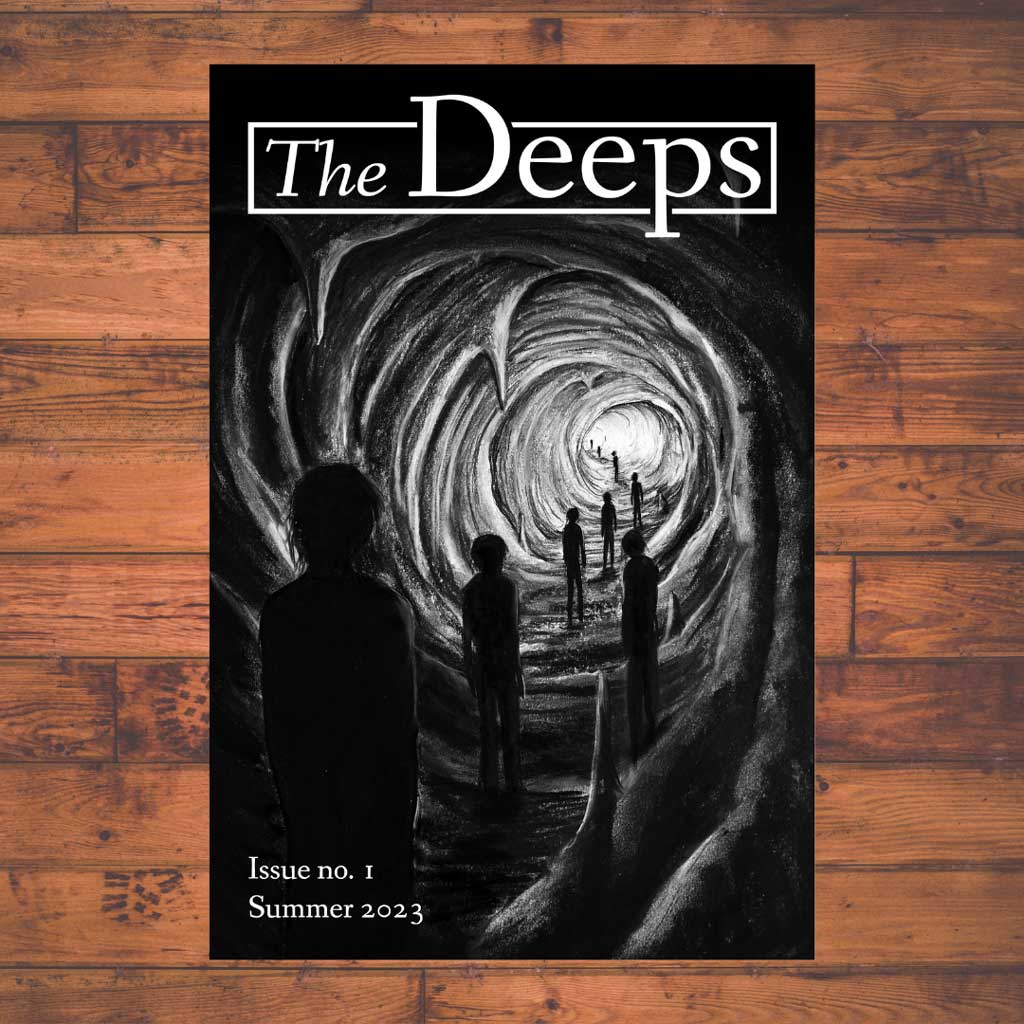Grad Student and Horror Fan LEAPs into Editing and Publishing

Love can lead one to do some surprising things. For instance, when Benjamin Vandersluis fell head over heels for literary editing and publishing during his final semester as an undergraduate at Chico State, he started reading the Chicago Manual of Style, 17th edition.
“I started on page one,” he laughed. “I found some of it genuinely interesting.”
That was in the fall of 2017. He graduated that December with a bachelor’s degree in English and then worked at the California Cooperative Rice Research Foundation for the next three years, helping with planting, harvesting, and of course, editing the annual report. Vandersluis also kept the flame alive as a freelance editor. In the middle of 2020, struggling during the pandemic and looking for a reset, he discovered that the University had revived its Literary Editing and Publishing (LEAP) Certificate Program. Vandersluis jumped at the chance to earn the certification as part of his graduate studies. And he’s thrilled he did.
“I can’t emphasize enough how influential the LEAP program was in bringing me back. And since it’s only been back for a couple of years, and because it’s an outstanding program, it’s important to me that people know about it,” Vandersluis said. “It’s hands-on experience with editing and publishing, and it gets your foot in the door of the industry.”
Vandersluis will graduate with his master’s degree in English and LEAP Certificate on May 17. But he had not fully considered the publishing and editing aspects of the works he loved to read until the final semester of his undergraduate studies—when he enrolled in Sarah Pape’s “English 415: Editing Literary Magazines” course. Students in that class publish the Watershed Review, the University’s literary magazine. The work includes the evaluation and selection of works, copy editing, and production, and it opened Vandersluis to a new avenue of storytelling possibilities.
“I’ve always had a fondness for writing and reading and everything in that regard, but I had never really thought about a text in terms of those fine details,” Vandersluis said. “The class was a gateway to a new experience that I loved.”
Professor Pape’s influence didn’t end there. She was also the catalyst behind the return of the LEAP program and a mentor and intern supervisor for Vandersluis. In those capacities, she helped provide him opportunities to network with other editors, publishers, and authors.
“I just could not have gotten where I am now without Sarah,” Vandersluis said. “She’s helped make this a phenomenal experience all around.”
Oh, the horror!
Late last year, Vandersluis stepped out in a daring way by starting his own publishing venture—Spindle House. The project marries his love for the horror genre, which was fostered and expanded during his time at Chico State, and editing and publishing. His website describes Spindle House as “an independent publisher of dark stories, especially those that are gothic, folkloric, cosmic, or psychological in nature. We are firm advocates of horror as a healthy and fundamentally human mode of storytelling. It is our mission to produce exceptional stories that are haunting in every sense.”
Vandersluis always enjoyed horror films and writing. But he sees the genre through a different lens now, thanks in part to the contributions of Pape, Professor Aydé Enríquez-Loya, fellow graduate student Katherine Wasche, and what he describes as a “killer” English Department.
“I’ve always had an interest in horror, but it’s generally not considered very academic. So, I really wasn’t expecting to be able to pursue that as a student,” Vandersluis said.
He credits the department and his peers with widening his perspective and calls Professor Enríquez-Loya “the first horror ally I had in the program.” In fact, his thesis idea was birthed when she mentioned she had once taught a class called “The Rhetoric of Horror.”
“She really helped me think about the genre in ways that I hadn’t often considered,” Vandersluis said.
He recently completed his thesis, which explores counterstory rhetoric in horror. He describes it as a combination of horror studies (general scholarship), critical race theory (in this case, how the genre is shaped by social conceptions of race and ethnicity), counterstory (a way underprivileged groups push back against dominant narratives through their own stories), and cultural rhetoric (stories told to make sense of customs and practices).
“If you analyze the genre just in terms of it being a scary story and you’re not looking at anything else, I think you’re getting a shallow understanding,” Vandersluis explained. “I’m proposing that we start thinking about horror stories in ways that consider the power dynamics that are being invoked. Part of what I argue in my thesis is that if you’re unpacking a lot of that extra information, you’re getting that more holistic understanding, and you’re actually getting more out of the story—the full horror that the author intended.”
Fellow teaching associate and graduate student Katherine Wasche had an office next door. The pair would often discuss their shared love for the genre. Vandersluis says those conversations helped him explore his thoughts about this new perspective. But he also credits Wasche for reminding him that “sometimes I needed to turn off my research brain and just enjoy the horror.”
Wasche (English, ’20; MA, English, ’22) has also started her own online publishing venture, Plucked Heart Press.

Into The Deeps
The learning, exploring, teaching, and talking Vandersluis exuberantly describes were all part of what he called an “unbeatable” graduate school experience.
“There’s so much at your fingertips,” he said. “The professors are accessible and there are so many opportunities to get involved. What I found is that as you invest in the program, you foster relationships with the faculty that are much more important and valuable than any essay or grade.”
He’s continuing to reap the benefits of their mentorship while embarking on his publishing career. His first Spindle House release—a chapbook written by his uncle and published in his memory—was part of the internship he did with Professor Pape.
On January 16, he officially pivoted Spindle House to a publisher of horror with a call for submissions and the following announcement: “Spindle House is proud to announce our debut magazine, The Deeps, which seeks to refocus on communal storytelling as the heart of horror. Each story we publish is intended to be read aloud, among friends, on a dark night.”
The first issue is scheduled to drop on June 21 and will be available in both e-book and paperback formats.
It’s been a true labor of love for Vandersluis with lots of learning edges. After expecting to receive approximately 80 submissions, he wound up with a stack of close to 500, only 13 or 14 of which will be in the issue.
“I learned that sending rejections is one of my least favorite things to do. Because there’s no way to get around the fact that it feels like you’re stepping on someone’s dreams every time,” Vandersluis said. “But on the other hand, one of the things I loved about the experience is that I really love the stories that did make the magazine. Knowing there’s an author who wrote something that I love and working with them professionally to publish it is a really good feeling.”
Stay current with Vandersluis’ plans to keep diving even deeper into the world of publishing by visiting his website or following him on Twitter or Instagram.


